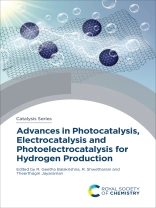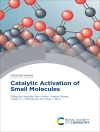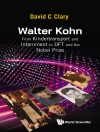Hydrogen has a lot of promise as an alternative to various carbon containing fuels as burning it releases only water which does not contribute to climate change. However, the standard method of producing hydrogen uses methane as the source, releases carbon dioxide and requires high temperatures and pressures meaning it cannot be considered a sustainable process. Photocatalysis, electrocatalysis and the combining of the two in photoelectrocatalysis offer pathways to producing hydrogen from different starting materials and with lower energy costs, which will be essential to making sustainable hydrogen fuel a reality.
Advances in Photocatalysis, Electrocatalysis and Photoelectrocatalysis for Hydrogen Production brings together the latest developments in applying these types of catalysis to producing hydrogen. This book is an important resource for anyone working in photo- and electrocatalysis or with an interest in routes for green hydrogen.
Jadual kandungan
- Introduction to Photocatalytic Hydrogen Production
- Perovskite-based Photocatalysts for Hydrogen Production
- Metal Oxide-based Catalysts
- Carbon-based Photocatalysts for Hydrogen Generation
- Metal–Organic Framework-based Photocatalysts for Hydrogen Production
- COF-based Catalysts for Hydrogen Production
- Metal Phosphide-based Photocatalysts for Hydrogen Production
- Transition Metal Dichalcogenide-based Photocatalyst Materials for Hydrogen Production
- Heterostructures, Plasmonics, and Quantum Dot Photocatalysts for Hydrogen Production
- Harnessing Both Light and Dark Conditions for Photocatalytic Hydrogen Production: Pathway for Ultimate Green Hydrogen
- Introduction to Electrocatalytic Hydrogen Production
- Transition Metal Dichalcogenide-based Electrocatalysts
- Metal and Metal Oxide-based Electrocatalysts for the Hydrogen Evolution Reaction
Carbon-based Electrocatalysts for Hydrogen Production - Metal Phosphide-based Electrocatalysts for Hydrogen Production
- Advances in Metal–Organic Frameworks for Electrocatalytic Hydrogen Generation
- Alternative Electrocatalysts: Exploring Quantum Dots and Transition Metal MXenes
- Introduction to Photoelectrocatalytic Hydrogen Production
- Catalysts for Photoelectrochemical H2 Production
- Commercialization Status of Electrocatalysis, Photocatalysis and Photoelectrocatalysis Processes
Mengenai Pengarang
Prof R Geetha Balakrishna obtained her Ph D in 2005 and since then has gone through various stages of teaching and research in her career including working at National University of Singapore, University of Notre Dame, USA, IRCELYON, Catalysis lab, France and also at JNCASR. She is presently the Director of a leading research Centre called “Centre for Nano and Material Sciences”, under Jain University. For more than two decades she has worked in bridging ‘materials and energy’ research and has contributed 199 research papers, four patents and guided 13 students leading to Doctoral and 06 students leading to Post Doctoral degrees. Her h index is 37 with citations of more than 5000. She has served as member of many renowned professional bodies and is a fellow of the Royal Society of Chemistry. Dr Geetha is a founder and CEO of a spin off company called Greenchem Nano Pvt Ltd. She is the recipient of CRSI Medal, MRSI medal, CRS Silver Star, Dr Kalpana Chawla State Award, The Mohammed bin Rashid Al Maktoum Global Water Award -2021 and Fulbright Nehru award for Academic and Professional Excellence. She is also a member of the Editorial Advisory Board of ACS Energy Letters and ACS Applied Engineering Materials.
Dr. Shwetharani R is an Assistant Professor in the Department of Centre for Nano and Material Sciences at Jain Deemed to be University. Dr. Shwetha holds a Ph D in Chemistry (Material Sciences) from Jain Deemed to be University (2016). She completed her postdoctoral stint at Shinshu University at Japan (2019-2020) and has 7 years of experience in academia. She is a recipient of JAUW international fellowship from Japan and also received SERB-TARE project to conduct research at IISc, Bangalore (2020-2023). She also received research funding from Jain Deemed to be University. Her research interests include preparation and property tuning of semiconductor based nanomaterials, 2D materials Mo S2, Mo Se2, perovskite oxynitride/oxysulfide, MPX3 materials for H2/O2 evolution (Photocatalytic/ Electrocatalytic) and also perovskite QDs property modification (Cs Pb X3), with a focus on renewable hydrogen generation and high PLQY perovskite QDs for sensing. Currently, she has published around 41 papers in international journals, 5 book chapters, 23 conference papers and one patent.
Dr. Theerthagiri Jayaraman is currently working as a Brain Pool Fellow at Gyeongsang National University, Jinju, South Korea. Dr. Theerthagiri worked as Scientist-C at Sathyabama Institute of Science and Technology (Deemed to be University). He completed his Ph.D Degree in the Department of Chemistry, Thiruvalluvar University in March, 2017. His current research is focused on the development of electrocatalysts for energy applications, hydrogen evolution reaction, and catalysis for energy and environmental remediations. Dr. Theerthagiri is an Editorial Board member in Bioengineered, and Science of Advanced Materials journals, and Associate Editor in IET Nanobiotechnology and Chemical Papers.












